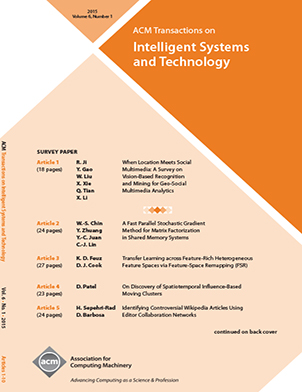Recommender System-Induced Eating Disorder Relapse: Harmful Content and the Challenges of Responsible Recommendation
IF 7.2
4区 计算机科学
Q1 COMPUTER SCIENCE, ARTIFICIAL INTELLIGENCE
引用次数: 0
Abstract
As users’ social media feeds have become increasingly driven by algorithmically recommended content, there is a need to understand the impact these recommendations have on users. People in recovery from eating disorders (ED) may try to avoid content that features severely underweight bodies or that encourages disordered eating. However, if recommender systems show them this type of content anyway, it may impact their recovery or even lead to relapse. In this study, we take a two-pronged approach to understanding the intersection of recommender systems, eating disorder content, and users in recovery. We performed a content analysis of tweets about recommended eating disorder content and conducted a small-scale study on Pinterest to show that eating disorder content is recommended in response to interaction with posts about eating disorder recovery. We discuss the implications for responsible recommendation and harm prevention.推荐系统诱发的饮食失调复发:有害内容与负责任推荐的挑战
随着用户的社交媒体推送越来越多地受到算法推荐内容的驱动,我们有必要了解这些推荐内容对用户的影响。处于饮食失调(ED)康复期的人可能会尽量避开那些显示体重严重不足或鼓励饮食失调的内容。但是,如果推荐系统还是向他们展示这类内容,就可能影响他们的康复,甚至导致复发。在本研究中,我们采取了双管齐下的方法来了解推荐系统、饮食失调内容和处于康复期的用户之间的交集。我们对有关饮食失调症推荐内容的推文进行了内容分析,并在 Pinterest 上进行了小规模研究,结果表明饮食失调症内容是在与有关饮食失调症康复的帖子互动后被推荐的。我们讨论了负责任的推荐和预防伤害的意义。
本文章由计算机程序翻译,如有差异,请以英文原文为准。
求助全文
约1分钟内获得全文
求助全文
来源期刊

ACM Transactions on Intelligent Systems and Technology
COMPUTER SCIENCE, ARTIFICIAL INTELLIGENCE-COMPUTER SCIENCE, INFORMATION SYSTEMS
CiteScore
9.30
自引率
2.00%
发文量
131
期刊介绍:
ACM Transactions on Intelligent Systems and Technology is a scholarly journal that publishes the highest quality papers on intelligent systems, applicable algorithms and technology with a multi-disciplinary perspective. An intelligent system is one that uses artificial intelligence (AI) techniques to offer important services (e.g., as a component of a larger system) to allow integrated systems to perceive, reason, learn, and act intelligently in the real world.
ACM TIST is published quarterly (six issues a year). Each issue has 8-11 regular papers, with around 20 published journal pages or 10,000 words per paper. Additional references, proofs, graphs or detailed experiment results can be submitted as a separate appendix, while excessively lengthy papers will be rejected automatically. Authors can include online-only appendices for additional content of their published papers and are encouraged to share their code and/or data with other readers.
 求助内容:
求助内容: 应助结果提醒方式:
应助结果提醒方式:


